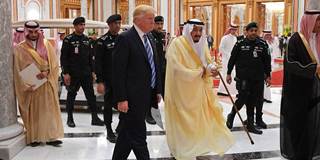World powers have often been known to intervene to overthrow other countries’ governments, install pliant regimes, and then prop up those regimes, even with military action. But, as recent terrorist attacks show, what seems like a good idea in the short term often brings about disastrous unintended consequences.
NEW DELHI – World powers have often been known to intervene, overtly and covertly, to overthrow other countries’ governments, install pliant regimes, and then prop up those regimes, even with military action. But, more often than not, what seems like a good idea in the short term often brings about disastrous unintended consequences, with intervention causing countries to dissolve into conflict, and intervening powers emerging as targets of violence. That sequence is starkly apparent today, as countries that have meddled in the Middle East face a surge in terrorist attacks.

NEW DELHI – World powers have often been known to intervene, overtly and covertly, to overthrow other countries’ governments, install pliant regimes, and then prop up those regimes, even with military action. But, more often than not, what seems like a good idea in the short term often brings about disastrous unintended consequences, with intervention causing countries to dissolve into conflict, and intervening powers emerging as targets of violence. That sequence is starkly apparent today, as countries that have meddled in the Middle East face a surge in terrorist attacks.